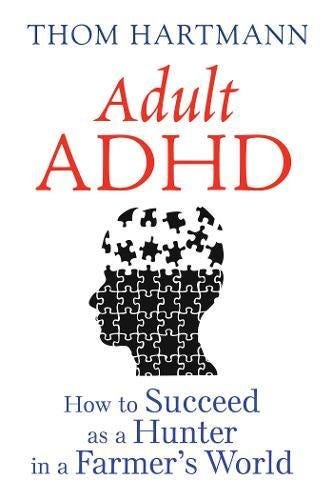Sunday Excerpt - Adult ADHD: How to Succeed as a Hunter in a Farmer's World
How to Succeed as a Hunter in a Farmer's World
Introduction
How This Book Will Help You
The great direction which Burton has left to men disordered like you, is this: Be not solitary, be not idle.
-Samuel Johnson, in a 1779 letter to Lord Chesterfield, referring to a quote from author Robert Burton (1577-1640)
There is a substantial sub-population of the world that has a common and somewhat consistent set of personality characteristics. These traits have, for many people, led to difficulties in school, relationship, and work, although these same traits, in other contexts, have guaranteed the survival of the human race and promoted innovation and transformation throughout history.
Because these people (as you’ll soon see) are neurologically optimized to succeed in a hunting and gathering environment (and its modern versions), I refer to them as Hunters. All the non-optimized people, I call Farmers.
Interestingly, because these same people often don’t do well in the boring environment of public school, our society has blamed them (rather than the schools) for their failure and come up with a label for them: Attention Deficit Hyperactive Disorder or ADHD.
When researching this subject, I was struck by the number of Hunter adults I met and interviewed who’d chosen to become entrepreneurs, to strike out on their own, to forge their own unique lifestyles and businesses independent of others. Most often these people are involved in an ever-changing life, often starting many businesses, or regularly leading their existing companies in new directions. They thrive on stimulation, and living “on the edge.”
One biography of Ben Franklin asserts that he was America’s, and possibly the world’s, first real entrepreneur. Rather than simply learning a trade and opening a lifelong business, Franklin learned dozens of trades, and created more than thirty businesses as well as social and governmental institutions. This is the core of entrepreneurship, as a company owner or as an “entrepreneur within a company” where your job involves constantly new projects or change – the creation of something new, over and over again.
When writing my first book proposing that ADHD was an adaptive, positive trait,[1] a psychologist who specializes in ADHD told me that perhaps as many as half of the entrepreneurs she’d seen in her work have ADHD. Now, a few years later and after conversations with thousands of entrepreneurs around the country, I’ve come to the conclusion that nearly all entrepreneurs are Hunters (or “have ADHD”), to one extent or another.
I’m not speaking here of the fellow who carefully invests his money in a corner dry cleaning shop, runs his own business on that corner for twenty-five years, to finally retire comfortably. While that person may meet some definitions of entrepreneurship, I’d rather refer to him or her as an independent small businessperson. Such people constitute an important and stable core of the business life of this country, but they’re not Hunters.
Instead, I’m speaking here of those individuals who create or participate in dynamic, thriving, ever-growing, ever-changing companies. People who take chances, who experiment the Henry Ford did when he had several bankruptcies before he hit on a formula that worked. Or Thomas Edison, who tried thousands of different variations before he could get a working light bulb.
These people’s lives are often littered with failures, but their successes have given a spark of vitality and enterprise to America, and made our country, particularly in its early days, unique in the world. They continue to bring us innovation and change that gives great hope and promise for the future of our nation and the world. Some have applied their entrepreneurial characteristics to become great leaders: John F. Kennedy and Winston Churchill, for example, stand out as historic Hunters. Others have made inventions or created businesses, social institutions, and art which have changed the world.
This book is about people who have overcome, and in many cases actually used, aspects of their ADHD to achieve prosperity or victory, and for those who would seek to emulate them. This book is for those who are willing to take chances, to forge a new niche in the business, social, cultural, political, or art worlds, or to create something new.
And it’s about how to do that successfully.
In the writing of this book, I’ve interviewed many people in the business world, including some of America’s greatest. Few want to jump up, raise their hands, and say, “Yes, I have something that psychiatrists call a disorder!” Nonetheless, all were, to my mind, Hunters to one extent or another. Their shared stories of successes and failures, from childhood through advanced age, are remarkably similar.
From these stories, and my own successes and failures as a businessperson and entrepreneur, I’ve assembled a collection of specific tools and techniques for Hunters to achieve success in the business world.



